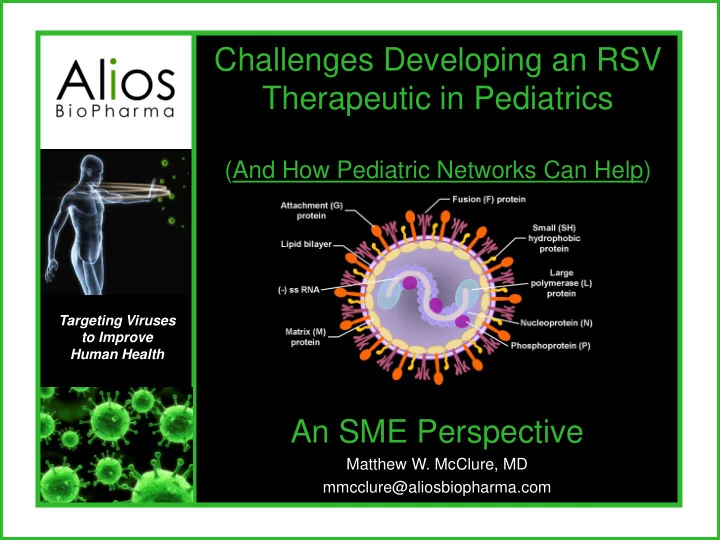

Challenges Developing an RSV Therapeutic in Pediatrics (And How Pediatric Networks Can Help) Targeting Viruses to Improve Human Health An SME Perspective Matthew W. McClure, MD mmcclure@aliosbiopharma.com Confidential and Proprietary
Alios - Background » Autonomous, Small Enterprise based in San Francisco, USA – ~45 employees, 4 of which are responsible for clinical development » Focused on developing antiviral compounds for a variety of infections, all of which adversely affect children – Hepatitis C virus (HCV) – currently in Phase 2 – Respiratory Syncytial Virus (RSV) – currently in Phase 1 Respiratory – Rhinovirus - preclinical Infections – Influenza virus - preclinical – Norovirus – preclinical » Development path for antivirals – Straightforward for HCV in adults – Less straightforward for RSV, a disease which most adversely affects very young infants (= target population for Alios RSV therapeutic) 2 7/10/2013
Clinical Challenges » Research Infrastructure – Among hospitals that care for children, there is a small percentage of institutions with needed experience performing industry-sponsored RCTs – Even fewer institutions with experience in RCTs of RSV therapeutics » Difficult enrolling subjects. Pediatric studies must – Overcome innate hesitancy of key stakeholders (Investigators, ECs, parents) to expose infants to any risk – Balance opposing forces, both of which are important to stakeholders • Safety (lower doses; more • Efficacy (higher doses; few placebo pts; more placebo pts) assessments, especially blood draws & PK) • Ability to recruit (fewer assessments, blood draws) 3 7/10/2013
What Alios is Looking for in a Partner Pediatric Research Network » Access to a pool of Investigators who – Have an interest in RSV (Peds ID, Peds Pulmonology, Pediatricians) – Have done industry-sponsored RCTs in infants • Stakeholders more likely comfortable with critical study design elements (e.g., blood draws/safety assessments, placebo control, use of investigational drugs in children) – Have the needed research infrastructure (e.g., research nurses) at their institution • Allows them to operate more efficiently (shorter timelines, greater recruitment), deliver better quality research » Networks which have already identified the most productive Investigators/Institutions within their regions – Especially valuable for seasonal virus like RSV, where we must follow it to many countries around the globe • Difficult as SME to screen and identify qualified sites across so many countries • Several geographically diverse Networks can significantly expedite this process 4 7/10/2013
Summary » There are many challenges which make development of an RSV therapeutic in infants difficult » Ideal partner Pediatric Research Networks can mitigate many of these challenges – Offer ready access to a “pre-screened” group of Investigators with • An interest/ability to study investigational compounds in a vulnerable infant population • Prior experience conducting industry-sponsored RCTs • The necessary research infrastructure to successfully conduct these RCTs – When multiple Networks are combined, they offer instant geographic diversification for a seasonal, global disease like RSV – Improves Alios’ probability of success in developing an RSV therapeutic in a timely fashion 5 7/10/2013
Recommend
More recommend